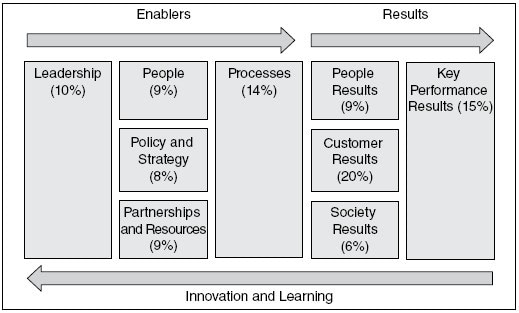How Can Buddhism Improve Organisational Processes?
I well remember a seminar in which I, along with other college principals, was introduced to the European Foundation for Quality Management Excellence Model. The seminar had been really very jolly until this slide came up:

One or two noses went rapidly and severely out of joint. The problem – you’ve probably already spotted it – is that Leadership contributes only 10% to the success of an organisation’s ‘enablers’ and processes – PROCESSES!!!!??? are 40% more significant. A little humility, it turned out, was a very hard pill to swallow.
But even for those who immediately saw some value in the Excellence Model the danger of complacency still lurks within it. Most colleges have very thoroughly documented quality assurance processes for example. But if there are perils in a principal assuming the college revolves around them it’s no less perilous for a principal to assume just because there’s a process in place, that it works.
It can sometimes take very little indeed to expose the fact that a great deal of resource is disappearing into a process that is actually pretty ineffective. On a recent visit to a college I asked quite a naïve question: Why is there no data analysis in the Self-Assessment Report (SAR)? Without hesitation the answer came back: Because they don’t ask for it.
They. The assumption at the back of my mind instantly changed. I was no longer thinking, how does this process work? but, The process is bust. Any improvement going on this area of the college’s work will be a pure matter of chance, dependent on random, independent, staff initiative.
It’s a rational conclusion to draw. The SAR is the most significant departmental process by which the quality of provision should be ascertained and developed. But in this case it clearly wasn’t that at all. It was merely a pro forma by which information which someone else had requested was passed on – or perhaps it felt like up – to them.
A quality assurance process was in place but it very obviously was not perceived by the person in charge of it as a means of improving quality and the chances are that this penny hadn’t dropped with senior college managers either. Hours and hours of data generation, analysis, writing and discussion were being invested in a process that was probably all but useless.
I leant back and remembered a great story about process decay:
A buddhist monk found his way to a forest monastery late at night. Everyone was asleep. He was cold and tired but there on the altar was a big wooden buddha. He took it down, broke it into pieces, set fire to them and fell asleep by their warmth.
The next morning in came the monks and immediately saw what had happened. ‘How shall we punish him?’ they cried.
‘Punish him?’ queried the abbott, ‘When he wakes, we shall praise him for reminding us never to confuse the Buddha with a lump of wood.’
Chris Thomson, Education Consultant and former sixth form college principal.












Responses